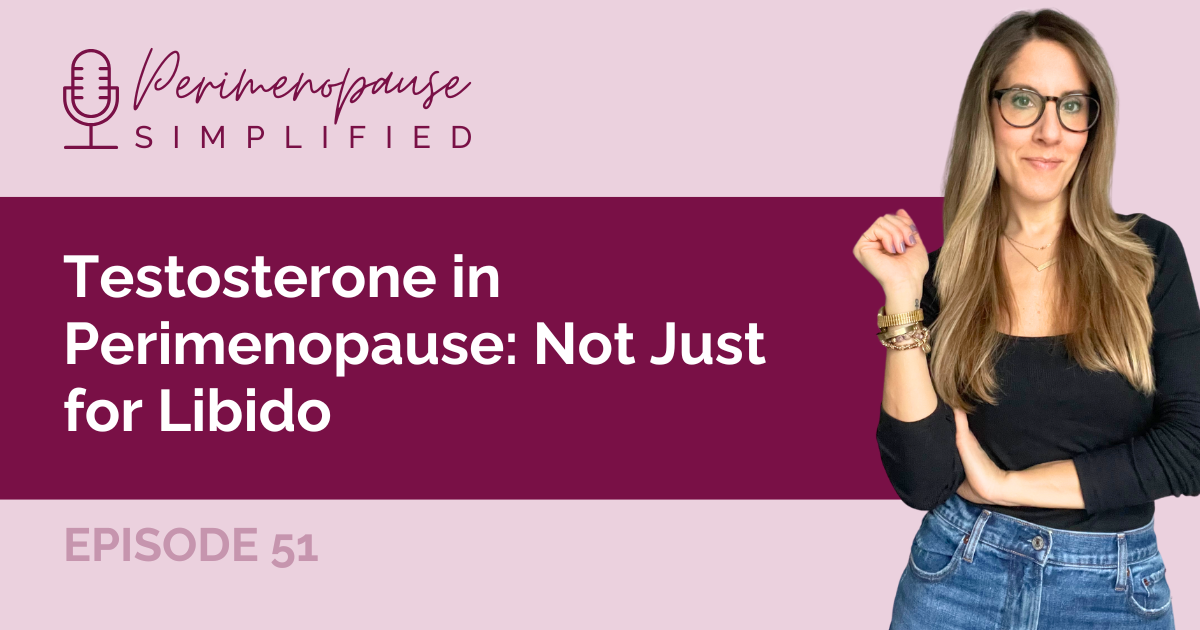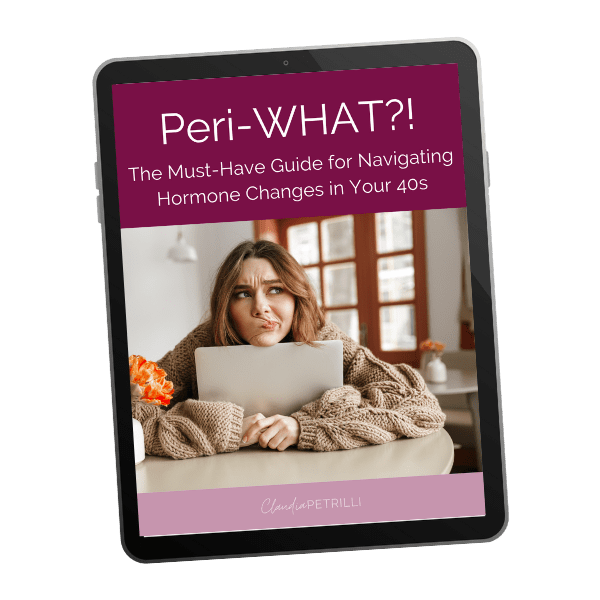
51. Testosterone in Perimenopause: Not Just for Libido
Don’t Miss An Episode!
Testosterone is not just about getting your mojo back in the bedroom—although, that’s a pretty nice bonus! It really is SO much more than that, especially for us perimenopausal women.
It plays a huge role in your energy levels, mood, muscle strength, and even how well you recover after exercise. It’s just as important as estrogen and progesterone in helping us feel our best.
In this episode, we covered:
- How testosterone impacts energy, muscle, strength, brain function & confidence
- What to know about testing testosterone
- Why ‘normal’ testosterone levels don’t tell you the full story
- PCOS in perimenopause
- Types of testosterone hormone replacement therapy for women
- Side effects of testosterone hormone replacement
- Alternatives to testosterone hormone replacement
Hey, welcome to the show! Today, we’re talking about testosterone in women. If you missed my episodes on estrogen and progesterone, make sure you go check those out.
But if you’ve been confused about testosterone, my goal with this episode is to clear some things up for you.
Testosterone: More Than Just Libido
First things first, testosterone is not just about getting your mojo back in the bedroom—although, let’s that’s a pretty nice bonus. It really is SO much more than that, especially for us perimenopausal women.
Testosterone plays a huge role in your energy levels, mood, muscle strength, and even how well you recover after exercise. It’s just as important as estrogen and progesterone in helping us feel our best.
How Testosterone Declines With Age
As we age, our testosterone levels start to dip, and that’s when we start feeling like we’ve hit a wall. It’s not just that mid-afternoon slump where you need a nap, it’s the kind of exhaustion where even getting out of bed feels like a monumental task.
Testosterone helps maintain energy by supporting the production of red blood cells, which carry oxygen to the muscles and tissues. With lower levels, you may feel sluggish, and it can even affect your mental sharpness. So if your brain is feeling foggy, low testosterone might be part of the issue. When your levels are optimized, it helps with both mental and physical energy—meaning you’re much better equipped to handle the never-ending to do list.
The Role of Testosterone in Muscle Strength
Testosterone is also crucial for maintaining muscle mass and strength. As we age, we naturally lose muscle and why strength training is so important—it helps preserve muscle, which in turn supports metabolism, and reduces the risk of falls or fractures later on in life. You may not even be thinking about falls or fractures because if you’re like most of my listeners you’re probably somewhere in your 40s or early 50s and that seems like such ways off but it’s important to take action NOW to minimize risks later. And I don’t know about you, but I really want to be strong, mobile and self-reliant when I get old.
Testosterone and Brain Health
Next is brain health. You might not realize it, but testosterone is also involved in cognitive function. As your levels drop, you might notice memory issues, a harder time concentrating, or brain fog – confusion, forgetfulness, and a lack of focus and mental clarity. Testosterone supports brain plasticity, which is your brain’s ability to adapt, learn, and function properly. So, keeping your testosterone in check helps keep your mind sharp, which is key for both work and life. Because let’s be honest, it’s embarrassing to forget someone’s name or what you meant to say in a meeting or interview.
Testosterone and Confidence
And—testosterone also impacts your confidence. Testosterone gives you that inner oomph. When your testosterone levels are optimized for you, you will feel more assertive, motivated, and capable of handling whatever life throws at you. Whether that’s asking for the raise, creating boundaries with a family member or friend, or finally tackling that to-do list, testosterone plays a big part in how confident and powerful you feel in your own skin.
Recap: Why Testosterone Matters
So, to recap, testosterone helps you with:
- Energy
- Muscle Mass
- Brain Health
- Confidence
It’s not just about feeling sexy or energetic—it’s about helping you live your life fully and with strength. That’s why it’s so important to understand how testosterone works for us as women, and why we may need it more than we think during this stage of life.
Testing Testosterone Levels
Now, you may be thinking, Cool, I’ll just get a blood test and see if I need more testosterone, right?’ Well..yes and no. Like progesterone and estrogen, testing testosterone can be tricky. Levels fluctuate and blood tests don’t always tell the whole story. But we typically have our clients test total and free testosterone to get an idea.
What’s more important is your symptoms! If you’re noticing low energy, weak muscles, a crashing libido, or just not feeling like yourself, those signs matter more than a lab number.
It’s not uncommon to see someone with ‘normal’ testosterone levels who’s still struggling with these symptoms. Listen to your body—it’s a better communicator than a piece of paper.
PCOS and Androgens in Perimenopause
On that note, let’s briefly cover PCOS, which many women don’t realize can still play a role in their perimenopause years. PCOS, or polycystic ovary syndrome often involves higher testosterone levels.
In this stage of life, PCOS can show up as irregular periods, weight gain, hair loss, or those stubborn chin hairs that keep popping up. Testosterone is part of this mix, and some women with PCOS may have symptoms of high androgens—like oily skin, acne, or even hair growth in places you don’t want.
And you may experience these symptoms when you start TRT. When I initially started T, I started to break out, had oilier skin, and hair. But I started off a little high and now I’ve optimized it and it’s been manageable. I believe it’s a good idea to start low and slow with testosterone hormone replacement therapy.
And for many women, jumping straight into testosterone replacement might not be the best move. I certainly didn’t start there. If you’re still having a cycle—or even if you’re not—starting with progesterone can often help balance things out before adding testosterone.
Think of it like building a house. Progesterone is the foundation—it helps calm your nervous system, improve sleep, and reduce anxiety. Once you’ve got that steady base, then testosterone can come in and do its thing. Or you may find you need to add estrogen first. I’m a fan of optimizing progesterone and estrogen, then adding in testosterone. But I’m not a prescribing provider and I know many like to save estrogen for last. But I believe that’s because there is still unnecessary fear around estrogen.
Types of Testosterone Replacement Therapy (TRT)
Moving along to testosterone replacement for women – this isn’t as straightforward as it is for men. There aren’t any FDA-approved testosterone formulations at the time of this recording for women in the US. That means most of us have to get compounded formulations or use a super low dose of a testosterone product made for men.
You’ll often see testosterone in the form of creams, gels, injections or pellets. I personally would be cautious with injections or pellets, more so pellets, because once they’re in, you can’t adjust dosing and you have to wait several months for the hormone level to decline. And they’re kind of a big commitment, you have to go get them inserted and they can be quite costly.
For most women, creams or gels work well, because you can adjust the dose as needed. I’m currently using a compounded testosterone cream that I apply every morning.
And on that note—please know it can take time to feel the full effects of testosterone once you start. Some women notice months of consistent use that their energy is better, libido has improved, and even their confidence.
Alternatives to TRT
If you’re hesitant about testosterone therapy, there are natural ways to support your testosterone levels:
1. Focus on Nutrition
- Testosterone production relies on specific nutrients like zinc and healthy fats. Include foods like lean meats, eggs, nuts, seeds, avocados, and fatty fish in your diet.
- Low levels of vitamin D are linked to lower testosterone. Try to get 20 minutes of sunlight a day, or consider a supplement with K2 if needed, based on testing.
2. Learn how to cope with stress more effectively – Chronic stress increases cortisol, which directly suppresses testosterone production.
- Practice stress-reducing techniques like meditation, yoga, deep breathing, or journaling.
- Consider adaptogenic herbs like ashwagandha or rhodiola
3. Prioritize Sleep
Testosterone production occurs while you sleep, so poor sleep can lower levels.
- Aim for 7-9 hours of quality sleep per night, try to avoid screens before bed.
4. Strength Training & Exercise
Regular resistance training or high-intensity interval training (HIIT) can support testosterone levels.
- Focus on exercises that use large muscle groups, like squats, deadlifts, or pushups, to stimulate hormone production.
5. Consider Herbal Support
There are some herbs to consider like Tribulus, Maca, or Fenugreek but use caution with these as they may have some contraindications.
If you want a deeper dive into this, consider my limited-time course Ignite Your Libido, available now. If you feel like you’ve lost your spark or your libido has gone MIA, the good news is: you can reignite, feel confident & reconnect with your partner naturally. And to dig deeper and address nutritional imbalances that may be contributing, you’ll have access to an HTMA hair tissue mineral analysis to assess micronutrients. More info HERE.
Final Thoughts
So there you have it, ladies—the lowdown on testosterone. It’s not just for libido (although that’s a pretty sweet perk), and it’s not a one-size-fits-all solution.
If you’re curious about testosterone replacement, start by tuning into your symptoms, working with a knowledgeable provider, and giving yourself grace during the process.
And remember, you’re not alone in this journey. Whether it’s oily skin, chin hairs, or just trying to get through the day without collapsing on the couch, I’ve got you.
Until next time, take care of yourself—and if you loved this episode, please share it with a friend and I’ll see you next time.
Sources:
https://pubmed.ncbi.nlm.nih.gov/31353194/
https://pmc.ncbi.nlm.nih.gov/articles/PMC7098532/
https://pubmed.ncbi.nlm.nih.gov/36585396/
https://womenshealth.obgyn.msu.edu/blog/testosterone-may-protect-memory-women
https://pubmed.ncbi.nlm.nih.gov/21058750/
https://www.news-medical.net/health/The-Role-of-Vitamin-D-in-Hormonal-Balance.aspx
Claudia Petrilli is a Functional Health Coach, Integrative Nutrition Coach, Women’s Health Educator, and creator of The Hormone Rescue program. Having experienced debilitating periods, digestive issues, a sluggish thyroid, a pituitary tumor, and perimenopause symptoms in her late 30s, she knows exactly what it’s like to get dismissed by doctors and spend years searching for answers.
Free Resources:
Peri-What?! The Must-Have Guide for Navigating Hormone Changes in Your 40s
Course:
Programs:
Connect with Claudia:
Have a question or episode topic suggestion? Please email: claudia@claudiapetrilli.com.
Love the show? Please subscribe, leave a 5-star rating, review, and share with others, so more women can find this podcast for guidance and support through their perimenopause journey!






